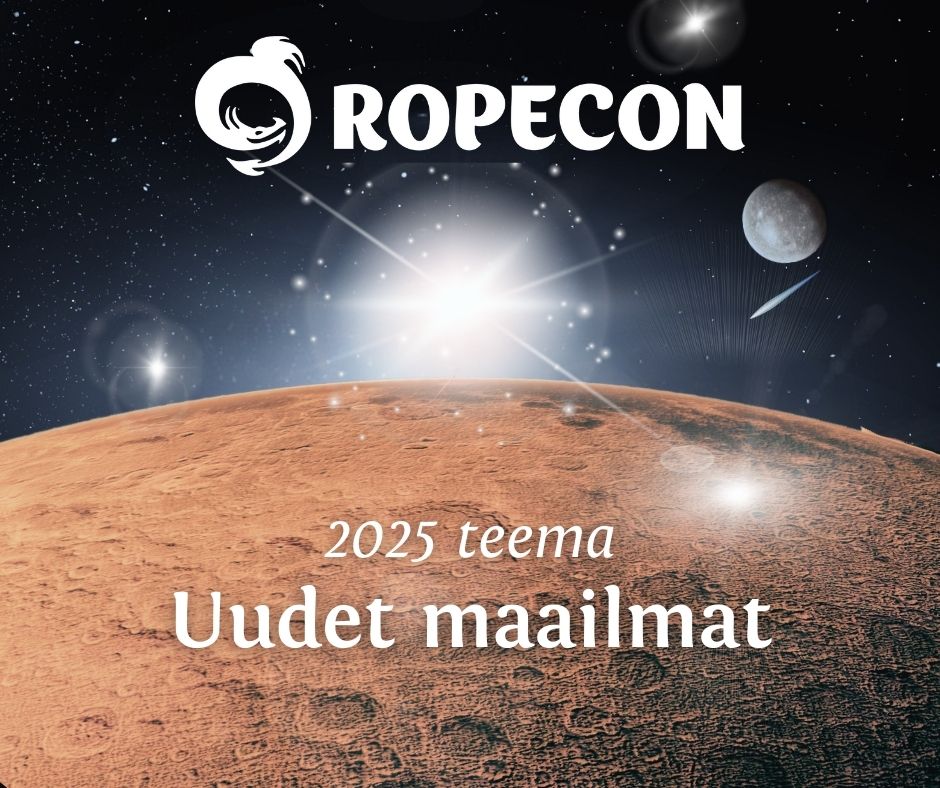
Ropecon 2025 Guest Honor Freja Gyldenstrøm
Interview with Freja was conducted by Ropecon GoH team / Jukka Seppänen over email.
Ropecon 2025 is honored to welcome game designer and writer Freja Gyldenstrøm as a Guest of Honor. Here is our interview with Freja, find out all about her and catch her sagely advice for aspiring larp creators!
Ropecon: Welcome to Ropecon 2025 as a Guest Honor Freja Gyldenstrøm! What would be your ”elevator pitch” ? In the context of Ropecon, who are you in 30 seconds?
Freja: Depending on the context, I identify as a writer, larp wright, narrative designer, game designer, or independent academic. I enjoy weaving fantasies, which can be horrifying or elating, and I try to involve that in basically everything I do.
Ropecon: What inspired you to become a larp/game designer/producer and how did you get started?
Freja: How far back should we go? As a 5-year-old, I used to tell stories to an imaginary troll family, which was when I decided to become a storyteller. I was also very dominant in my childhood games of play-pretend with friends, where I would strictly direct the scenes of warrior-damsel almost dying in the woods or 14-year-old pages who are secretly girls fighting it out and then falling in love across crossed swords. So I guess that’s where it started.
I ran my first larp with a group of friends the same year I started studying Comparative Literature. Writing larps was a way to trick myself into writing creatively, because it didn’t have to be perfect, but still came with a deadline and expectations. My second larp as an organizer was the first College of Wizardry, which took off and cemented that maybe there was something to this. It also leveled up my skills dramatically in a short time because it was such an insane amount of work.
I got into professional game writing through Vampire: The Masquerade, mostly by being in the right place at the right time and having an interest in Gothic fiction. I started out as a copyeditor and got writing tasks when they fell between the cracks.
I’ve since learned that story design is on a pretty short list of things I’m good at that you can feasibly make a career out of, so it’s more of a hostage situation than a choice at this point. I like it here, though!
Ropecon: Our theme this year is ”New Worlds”. What are your favorite new frontiers and worlds?
Freja: I’m very inspired by dreams and how dream logic can seamlessly shift who you are, where you are, and what you are, as it tells a story. Maybe because I’m lucky that my dreams are very narrative. I’ve dreamt the yearly celebration of the day the witches established the ”hexocracy” (”heks” is the Danish word for witch), a zombie apocalypse with centaurs, the world under water. It’s so interesting to me how, when you dream, you can lose touch with what you are in reality and return with something a bit otherworldly, be it a feeling or some new sense of being. I suppose that’s also what I love so much about roleplaying games.
It hasn’t been new for 30 years, but Michael Marshall Smith’s Only Forward is one of my favorite representations of dream logic.
Ropecon: Which games or game worlds have you found particularly inspiring, and have they influenced your work?
Freja: I know it’s a sequel to the original Planescape: Torment, but I first played Torment: Tides of Numenera, which made a massive impression on me because the writing is so rich. The same for Disco Elysium. In both games, you play a protagonist with amnesia, and you get to rediscover and redefine who you are while getting glimmers of a past you’ve forgotten. I think it’s powerful because, in a way, every RPG protagonist has memory loss when the player first inhabits them. There might be a written background, but assuming it wasn’t the player who wrote it, it’ll feel less emotionally true to them than the things the character goes through with the player. The amnesia is just a way to use that emotional disconnect to deepen the experience. I’m also very inspired by the polyphonic inner monologue in Disco Elysium because of how it reflects our own inner landscape.
I can’t point a finger at where these games shine through in my work, but I do constantly think about how to constitute fictional selves that a player can inhabit in ways that feel natural and inspiring in a dreamlike manner – and which are perhaps even spacious enough that the player can see some of themselves within them and use that experience to grow in some way
Ropecon: What do you enjoy most about attending gaming conventions, and what are you looking forward to at Ropecon this year?
Freja: I love getting fresh perspectives on game design, exchanging ideas, and just the joyful chaos, where you can run into anything around the next carpeted hallway corner. It’s going to be my first Ropecon, so I’m so excited to discover it. I especially look forward to meeting lots of interesting and clever people.
Ropecon: What advice would you give to aspiring larp creators who are just starting out?
Freja:
- Don’t set your standard based on the production value of the larps that get the most publicity. Those organizers have been making games for 15+ years, or are working with people who have, and a lot have used what they learned to continue as professionals in event management, photography, scenography, writing, or whatever. Your first larps are supposed to be cheap, uncomfortable, start 3 hours too late, use pictures you took yourself of your friends or put together from stock art for the website, and experiment with techniques and equipment that may or may not work out. Especially if you’re still young. Don’t pressure yourself into making something more complex and demanding than you’ve got the resources and time for.
- A great way to start is to join existing projects as a helper. However, it’s unfortunately often part of the nature of volunteer work that you’ll get less than you deserve if you don’t ask for it. I’m talking anything from breaks and food during runtime to paid transport, a spot at the larp, or just basic boundaries for when you are available. What’s reasonable depends on how much help you’re providing compared with how much you gain from the experience, but at minimum, I’d recommend finding out what the conditions are for the rest of the team. Larp organizing can be a burnout mill, and the best way to avoid that is to make sure you put your energy where you’re valued and reserve enough of it for rest.
- I want to give some bad piece of advice. Like so much creative work, the main task is to simply do it. Forget doing it perfectly. To set yourself up, the time to sell tickets is when you’ve secured the location and made the basic website with info about the core of the experience and how to pay. Anything else comes after, when you’ve trapped yourself into doing it. From that also follows that anything besides what you’ve promised the players is subject to change.
- Remember that larp is collaborative. Set that expectation in your communication, in your workshops, and in your design. You’re not giving the players an experience. You’re creating a framework for them to craft the experience together with you. Making sure they remember that will help you when things out of your control go wrong and also make a better larp for everyone involved.
Ropecon: Can you share any details about any upcoming projects you’re currently working on? Feel free to advertise a bit!
Freja: I’m involved with a number of World of Darkness projects, which will show up on the Renegade webpage eventually. It’s a pretty long way from creation to publication, so I can’t usually talk about anything I’m currently doing for them. But I’m excited about the In Memoriam Vampire sourcebook I was a developer on and which comes out this summer! It’s about the ancilla experience, so the melancholy and strangeness of playing vampires who have been around for a century and two and seen everyone they loved as mortals die. It turned out very romantic, I think, in the Mary Shelley, Robert Eggers sense.
Aside from that, I’m part of the team preparing the 5th and 6th runs of The Forbidden History, a ”dark academia” larp inspired by Donna Tartt’s The Secret History, Dead Poets Society, and our own academic obsessions. Since it’s a larp about the search for the sublime, we’ve had a hard no-dead-darlings policy, and the character design is quite elaborate. We’re not running again until next year, but we’re currently reworking all the characters to make sure they’re as polished and heartbreaking as they possibly can be. The sign-up is closed, but there’s a waiting list, so anyone interested still has a chance to join!
I’m also, very softly, playing around with creating a series of smaller larps that center feminine monstrosity as artistic empowerment. The hexocracy, so to speak.
I usually only know what I’m doing a few months ahead, so I’m open to future collaborations. I keep my portfolio here: https://gyldenfrej.journoportfolio.com/.
Ropecon: In addition to games, what other academic interests / hobbies do you have, and do they influence your creative work?
Freja: Academically, I’m fascinated by the stories that embody transgression, transformation, and transcendence. I’ve focused a lot on Greek deities and how they’ve survived and changed in myths from antiquity to the modern day, for instance Pan, who went from being a dual-natured manifestation of uncultured nature to a tame pastoral figure in baroque paintings to becoming a rapey fantasy monster in the late 1800s and a queer liberation symbol in the 1910s. I have such a deep interest in history and the stories people told themselves in the past, and references to historical fun facts sneak into my writing constantly.
Besides that, I love many different types of crafting. Right now, I’m sewing a chatreuse 1880s evening gown and embroidering a patch of moss for my reading chair. It’s all creative, but it’s a very different type of satisfaction when you hold a physical item you made.
Ropecon: Finally, if you could give one sagely piece of advice to us gamers everywhere, what would it be?
Freja: Figure out which kinds of games you play because they renew and inspire you, and which you use to hide from the things that stress you out, and make conscious choices about how you spend your time. I’m not making a dig at the second type here because sometimes that’s exactly what’s needed. But I think a lot of us are struggling with being present in our own lives with everything that’s going on in the world right now, and that makes it more important than ever to make sure you feed your soul in ways that strengthen it.
